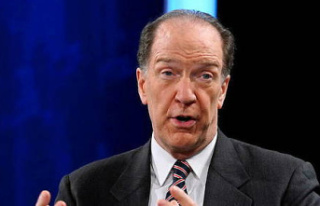The United States in default: This unprecedented situation could occur as early as July if no agreement is reached by then between the White House and the Republican opposition to raise or suspend the debt ceiling. “If the debt ceiling remains unchanged, the government's ability to borrow through extraordinary measures will be exhausted between July and September 2023,” the Congressional Budget Service (CBO) warned Wednesday, February 15 in its updated forecast. .
The debt of the world's largest economy reached $31.4 billion on January 19, the ceiling beyond which the country can no longer issue new loans to finance itself, and can therefore no longer honor its payments. Temporary emergency measures have been taken to continue paying. But when there is no more cash, the risk is to arrive "to late payments [...], a default on government debt obligations, or both", adds the CBO, agency politically independent to provide Congress with budget and economic analysis.
Raising the debt ceiling is a priori a technical measure, but which requires the agreement of Congress. It is a chestnut of American political life, the stake of a bitter battle between Democrats and Republicans, with often nocturnal negotiations as the deadline approaches. Since 1960, the US debt ceiling has been raised 78 times, according to the Treasury Department. The Republicans, now having the majority in the House of Representatives, oppose Democratic President Joe Biden, whom they accuse of spending recklessly. However, without an agreement, the American economy, and even the world, would plunge into the unknown.
This CBO publication gives a clearer idea of when the United States could run out of cash. To continue to honor financial commitments, the Treasury Department – the United States Department of Economy and Finance – has thus, among other things, ceased payments to pension funds and health or disability benefits for public officials, without delaying payments to beneficiaries at this stage. It suspended new debt issuance until June 5.
"Continued use of these measures along with steady cash inflows would allow the Treasury, in the CBO's estimate, to fund government operations through the summer without raising the debt ceiling, delaying payments or non-payment," the agency said. In early February in his State of the Union address to Congress, President Biden accused the Republican opposition of wanting to "hold the economy hostage."
The CBO has also estimated that the US budget deficit should be $1.4 trillion in 2023. It should then average $2 trillion per year over the 2024-2033 period. The deficit had totaled nearly $2.8 trillion in 2021, due to the federal government's pharaonic budget spending to keep the US economy afloat in the face of the Covid-19 pandemic.
As for inflation, it should be higher in 2023 and 2024 than what the CBO anticipated last May, when it published its previous forecasts. The agency is counting on 4.8% and 3.0% respectively, according to the CPI index, which is a reference and which rose in 2022 to 8.0%. Gross domestic product (GDP) growth, on the other hand, should be weaker than expected, with only 0.3% expected for this year.












